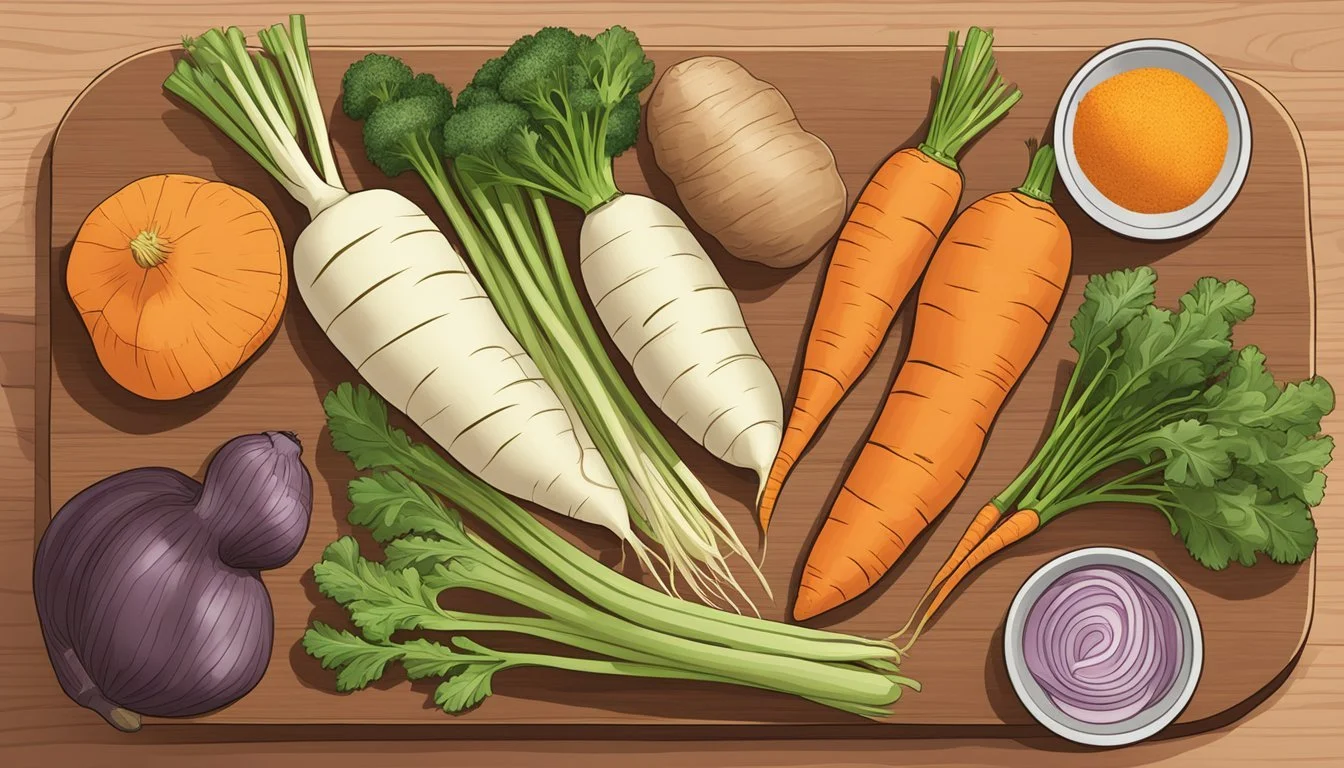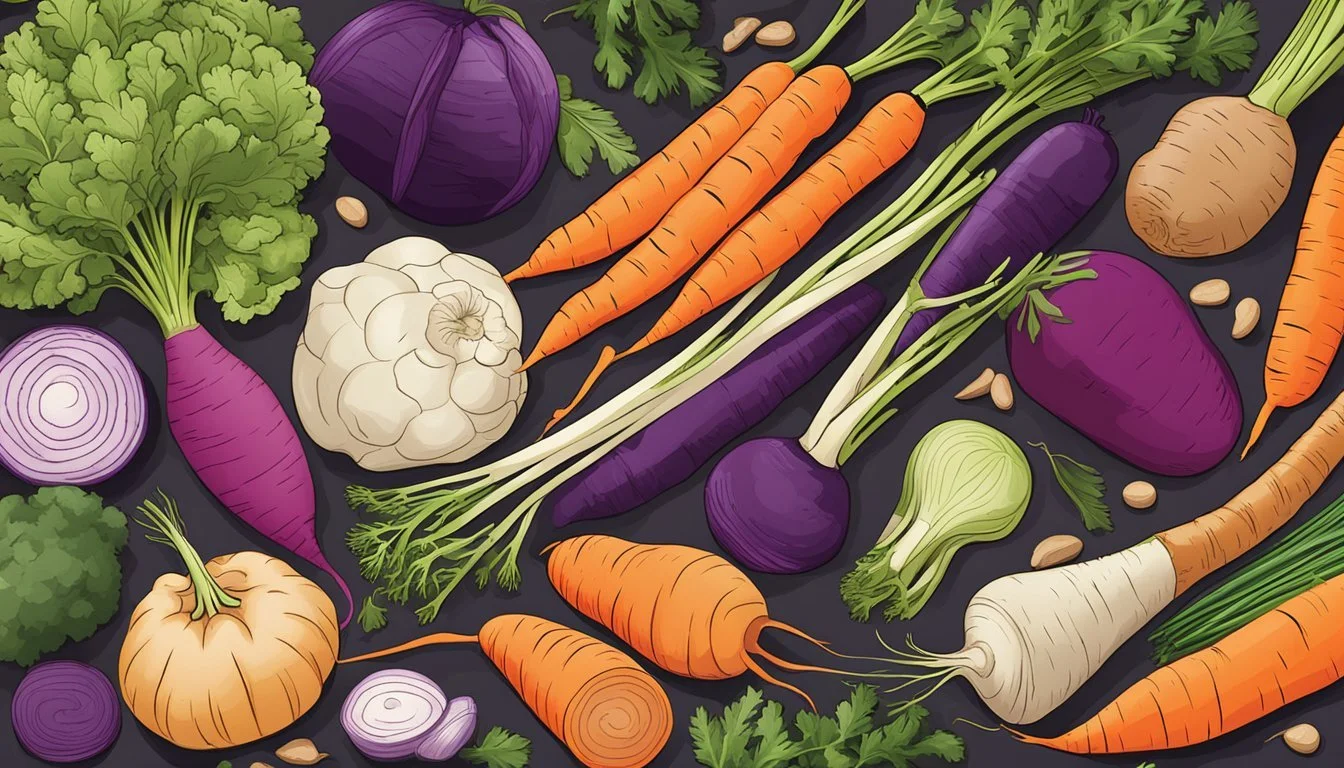Carrots Substitutes
Top Alternatives for Cooking and Baking
When it comes to adding flavor, texture, and nutrition to a dish, carrots are a staple in many kitchens. Whether you're aiming for the sweetness they bring to bolognese sauces or the crunch they add to salads, there are times when you might need an alternative. Fortunately, a range of vegetables like squash, zucchini, and celery can step in to fill the gap left by carrots, ensuring your recipes remain delicious and nutritious.
For those looking to replicate the sweetness and vibrant color of carrots, butternut squash is a great option. On the other hand, celery can provide a similar flavor profile without overwhelming the dish with sweetness, making it an excellent substitute in savory recipes. Additionally, zucchini offers a juicy and versatile option, perfect for a variety of dishes, from salads to baked goods.
Choosing the right substitute depends on the specific dish you're preparing and the qualities you value most in carrots. Whether you’re focusing on nutritional content or flavor balance, there’s likely a suitable vegetable ready to enhance your culinary creations. Experimenting with different carrot substitutes can not only maintain the integrity of your dish but also introduce new and exciting flavors to your cooking repertoire.
Understanding Carrots and Their Role in Cooking
Carrots are a versatile vegetable known for their sweetness and earthy flavor, and they can enhance various dishes. Their nutritional value, including high vitamin A and fiber content, makes them a staple in many diets. The following subsections explore their nutritional benefits, common cooking applications, and flavor and texture characteristics.
Nutritional Benefits of Carrots
Carrots are rich in essential nutrients, particularly vitamin A, which is crucial for maintaining good vision and supporting the immune system. One medium-sized carrot can provide over 200% of the recommended daily intake of vitamin A.
Besides vitamin A, carrots offer dietary fiber, which aids digestion and can help maintain healthy blood sugar levels. They also contain significant amounts of vitamin C, potassium, and antioxidants, which collectively contribute to overall health.
Common Cooking Applications
Carrots can be used in a multitude of cooking methods, including roasting, boiling, and steaming. Their natural sweetness and firm texture make them ideal for both savory and sweet dishes.
In savory applications, carrots are often found in soups, stews, and stir-fries. They can also be shredded and mixed into salads or used in dips. For baking, carrots are a primary ingredient in treats like carrot cake and muffins, where they add moisture and a subtle sweetness.
Flavor Profile and Texture Characteristics
Carrots are known for their slightly sweet and earthy flavor. This unique taste makes them versatile, as they can complement a variety of other flavors. The texture of carrots ranges from crisp and crunchy when raw to tender and soft when cooked.
Their vibrant orange color is due to beta-carotene, which not only provides health benefits but also adds visual appeal to any dish. The balance of sweetness and earthiness allows carrots to blend well with both spices and herbs, enhancing the overall flavor profile of recipes they are included in.
Reasons for Seeking Carrot Substitutes
People look for carrot substitutes due to allergies, dietary restrictions, or to experiment with different flavors and textures in their meals. Understanding these reasons can help in choosing the best alternatives that meet specific needs.
Allergy and Dietary Restrictions
Carrot allergies, though not very common, do occur and can cause people to seek substitutes. Those with oral allergy syndrome may react to carrots due to cross-reactivity with other allergens like birch pollen.
Dietary restrictions also play a significant role. For individuals on a low-FODMAP diet, carrots may be limited, requiring substitutes like zucchini or squash. Certain health conditions may necessitate avoiding beta-carotene-rich foods, thereby driving the need for alternatives.
Choosing the right substitutes ensures that nutritional needs are met without triggering allergies or violating dietary guidelines. For example, substitutes like celery or zucchini provide similar textures without the allergenic risks associated with carrots.
Exploring Unique Flavors and Textures
Personal preference drives the quest for unique flavors and textures in cooking. Carrot substitutes offer an opportunity to experiment with different ingredients that can enhance a dish in new ways.
For instance, swapping carrots for parsnips can add a distinct, slightly nutty flavor. Squash varieties like butternut or acorn can replace carrots in hearty dishes, providing rich and creamy textures.
These alternatives allow for creative culinary exploration, enabling chefs and home cooks to craft dishes that cater to varied taste profiles. Whether it's a sweet or savory dish, there's a carrot substitute that can bring a refreshing twist to traditional recipes.
Vegetable Substitutes Overview
There are several vegetables that can stand in for carrots in various dishes, each offering unique flavors and textures. Common substitutes include root vegetables like parsnips, versatile squashes, and mild-flavored options such as zucchini and celery.
Root Vegetables Similar to Carrots
Parsnips have a slightly sweet, nutty flavor and are an excellent carrot substitute in roasts, soups, and stews. They're rich in vitamins and fiber, making them a nutritious choice.
Beets add vibrant color and an earthy taste to dishes. They can be roasted, steamed, or used in salads, providing a different but complementary flavor profile.
Daikon radish is another root vegetable that can replace carrots, especially in Asian dishes. It has a mild flavor and crunchy texture.
Squashes and Gourds as Alternatives
Winter squashes such as butternut, acorn, and honey nut squash are suitable for heartier recipes. They can be roasted, used in soups or curries, adding sweetness and rich flavor.
Summer squash, including varieties like zucchini, offers a tender texture and mild taste. It works well in stir-fries and lighter soups.
These squashes are rich in vitamins and minerals, making them nutritious substitutes for carrots.
Mild-Flavored Vegetables for Subtle Sweetness
Zucchini is a versatile vegetable with a mildly sweet flavor. It's excellent for both sweet and savory dishes and can be grilled, sautéed, or used in baking.
Celery can replace chopped carrots in salads, dips, and sauces. It provides a similar crunch but a less sweet profile.
Leaf stalks and roots of celery are all edible, giving flexibility in different recipes.
Using these vegetables allows for variety in cooking while maintaining nutritional benefits.
Preparation and Cooking Tips for Carrot Substitutes
When using carrot substitutes, it is vital to consider adjustments in cooking times and flavors to achieve the desired texture and consistency. Maximizing the flavor profiles ensures your dish is as tasty as it would be with carrots.
Adjustments for Cooking Times and Flavors
Carrot substitutes, such as butternut squash, acorn squash, and celery, require modifications in cooking times and seasoning.
Winter squash varieties, like butternut and acorn, need longer cooking times compared to carrots. They can be roasted or boiled until tender.
Celery, with its quicker cooking time, retains a crunchy texture and often needs less than half the cooking time of carrots.
When replacing carrots, consider the flavor. Squash brings sweetness and nuttiness, which may alter the overall taste. Adjust seasoning accordingly, perhaps reducing other sweet elements or adding more savory spices to balance.
Achieving Desired Texture and Consistency
Different substitutes have varying textures and fiber content, affecting the final dish.
Squash softens considerably when cooked, making it suitable for purees, soups, and baked goods. Celery maintains a crisp texture even when slightly cooked, ideal for salads and stir-fries.
For dishes where crunchiness is essential—like raw snacks and salads—celery or summer squash are preferred. Ensure small, uniform pieces for even cooking and texture distribution.
For a smoother texture in soups and stews, longer cooking and thorough mashing or blending of winter squash are recommended. This helps achieve a consistency similar to cooked carrots.
Maximizing Flavor Profiles
Maximizing the flavor of carrot substitutes involves using complementary herbs and spices.
Butternut squash and acorn squash provide a naturally sweet flavor, enhanced by spices like cinnamon, nutmeg, or paprika. These work well in both savory and sweet recipes.
Celery offers a distinct earthy flavor, enriched with herbs like parsley, thyme, or dill.
Grilling or roasting these substitutes enables caramelization, especially in squashes, which deepens flavor and adds a pleasing aroma to dishes. Adding a touch of olive oil, salt, and pepper before roasting brings out the best flavors.
Cooking techniques like steaming or boiling should be adjusted to retain the natural flavors and nutrients, enhancing with minimal seasoning to maintain the integrity of the substitute.
Health Considerations When Choosing Carrot Substitutes
When looking for alternatives to carrots, considering the health benefits of these substitutes is essential. Certain substitutes are rich in essential vitamins and minerals, while others are low in calories, making them suitable for weight management.
Substitutes Rich in Vitamins and Minerals
Root vegetables such as parsnips and squash are excellent substitutes, boasting high levels of essential nutrients. Parsnips are rich in vitamin C, which supports immune function, and they also contain significant amounts of potassium, promoting heart health.
Squash, both winter and summer varieties, offers an abundance of vitamin A, crucial for vision and skin health, as well as vitamins C and K. Winter squash, including butternut and acorn, is particularly beneficial for maintaining good digestive health due to its high fiber content.
Another substitute, zucchini, is packed with vitamins B6 and C, contributing to better energy metabolism and immune defense. Its mineral content, including potassium, ensures proper muscle function and cardiovascular health. These nutrient-rich vegetables not only replicate the health benefits of carrots but also diversify one's nutritional intake.
Low-Calorie Options for Weight Management
For those watching their weight, selecting low-calorie substitutes is essential. Zucchini stands out as a top choice, with only 20 calories per cup. Its high fiber content helps maintain a feeling of fullness without adding extra calories, making it ideal for calorie-conscious individuals.
Celery is another low-calorie option, commonly used in salads and dips. It provides a satisfying crunch while being very low in calories. Additionally, celery is rich in water and fiber, aiding digestion and hydration without contributing significantly to caloric intake.
These low-calorie substitutes can help individuals manage their weight effectively, combining flavor, nutrition, and health benefits in a balanced diet.
Incorporating Carrot Substitutes into Diets
Incorporating carrot substitutes can be seamless and beneficial, especially when considering specific dietary needs and nutrient content. Below are options that cater to keto diets and provide high nutritional value.
Keto-Friendly Carrot Alternatives
For those following a keto diet, finding low-carb options is crucial. One excellent substitute is zucchini. With only 20 calories per cup, zucchini is low in carbs and high in fiber. It brings a mildly sweet flavor and tender texture, making it suitable for both savory dishes and baking.
Celery is another keto-friendly option. It contains fewer carbs than carrots and can be used in salads, soups, and stir-fries. Use its stalks for a nice crunch in dishes, or blend it into sauces and dips for added texture without compromising the keto guidelines.
Nutrient-Dense Substitutes for Balanced Diets
For those focusing on nutrient-rich alternatives, butternut squash is an excellent choice. It provides a healthy dose of vitamins A and C, along with potassium. Use it in soups, stews, or roasted as a side dish. Its slightly sweet taste works well in savory and sweet dishes alike.
Winter squash, such as acorn or honey nut varieties, is also a great option. These squashes offer a rich source of vitamins and minerals and can be a direct replacement for carrots in many recipes. Enjoy them in hearty soups or curries for a nutrient-packed meal.
Zucchini not only fits keto diets but also offers essential vitamins and minerals. Its versatility allows it to be a part of numerous dishes, providing both flavor and nutrition.
Creative Recipe Ideas Using Carrot Substitutes
Substituting carrots can open up a world of new flavors and textures in your dishes. Butternut squash and celery, among other substitutes, bring unique characteristics to both sweet and savory recipes.
Sweet Treats with Alternative Vegetables
Butternut squash makes a wonderful replacement for carrots in sweet baked goods such as carrot cake or muffins. Its natural sweetness pairs perfectly with warm spices like cinnamon and nutmeg. Butternut Squash Muffins can be baked using the same ratios you would for carrots, giving your baked goods a moist, rich texture.
Pumpkin can also replace carrots in pies and quick breads. Pumpkin Pie offers a creamy alternative, packed with beneficial vitamins and minerals. In smoothies, raw or cooked sweet potatoes can replace carrots to add a creamy, sweet element, especially when blended with tropical fruits like mango or pineapple.
Savory Dishes Featuring Substitutes
For savory dishes, butternut and acorn squash are excellent substitutes in soups, stews, and stir-fries. Squash Soup can be flavored with herbs and spices like thyme, sage, and a sprinkle of nutmeg to bring out its nutty flavor.
Celery is another versatile substitute. Use chopped celery in salads and slaws for a crunchy texture. It works well in sauces too, providing a refreshing taste to creamy herb sauces. Moreover, celery can be a subtle stand-in stir-fry ingredient, retaining its crunchiness while absorbing the flavors of other components like garlic, ginger, and soy sauce.
Celeriac roots can be a great addition to soups, giving a creamy consistency and a mild flavor that complements various herbs and spices.







